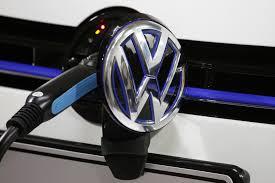China VW EV Plan
 |
Inside VW's blueprint to meet Beijing's quotas for EV output
Commentary By Yang Jian | 2019/1/25
SHANGHAI -- When Beijing floated a carbon credit program in 2016 with the goal of prodding automakers to ramp up electrified vehicle output, Volkswagen Group and the German government complained about the program’s hasty rollout.
But to no avail. The program was enacted this month, and VW, which derived 39 percent of its global sales from China last year and is the country’s biggest automaker, has no choice but to comply.
The carbon credits automakers qualify for vary and the credits EVs will earn will be based on their estimated driving range. But in general, an automaker’s electrified vehicle output must rise to above 5 percent of overall light-vehicle production over time.
To meet requirements under the program, which is essentially a quota system, the German auto giant has hammered out a three-stage strategy, according to company executives in China.
In the initial stage, VW will focus on expanding its mix of plug-in hybrids in China.
It has launched three plug-in hybrids under the VW brand -- plug-in variants of the locally built Passat sedan and Tiguan crossover, and the imported Variant wagon.
In 2019, it will introduce plug-in hybrid versions of three additional models -- the locally produced Magotan sedan and the Tayron crossover, and the imported Touareg crossover.
Audi, which offers plug-in hybrid versions of the locally built stretched A6 sedan and the imported Q7 crossover, is set to introduce a plug-in hybrid version of the locally produced stretched Q2 crossover in the first half of 2019.
This year, VW will roll out three all-electric vehicles adapted from locally built, gasoline-powered sedans -- the Lavida, Bora and Golf.
The third stage will begin unfolding in late 2020 when VW begins selling full-electric vehicles developed on its new EV platform, MEB, under the VW and Audi brands.
The next-generation EVs will be built at a plant jointly owned by VAW and FAW Group Corp. in the south China city of Foshan as well as an EV plant the German automaker is building with SAIC Motor Corp. in Shanghai.
VW group sold nearly 4.21 million vehicles in China last year, nearly all of which were gasoline-powered models.
Guided by the three-stage strategy, it seeks to launch 30 EVs and plug-in hybrids in China in the next two years, boosting annual sales of electrified vehicles to 400,000 in 2020, VW China CEO Stephan Wollenstein said at an industry event in Beijing this month.
No other global automaker has formulated such a detailed plan on introducing EVs and plug-in hybrids in China as VW.
But time is ticking away. Now that Beijing’s carbon credit program is the law, companies must plan, engineer and execute quickly to increase electrified vehicle offerings in the market.


